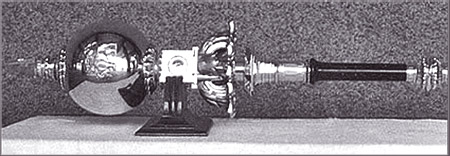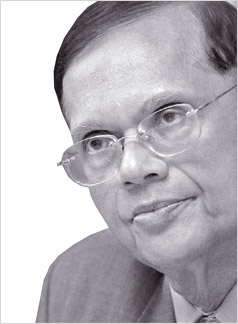|
‘...these countries are not PERSONALLY ANGRY WITH US’
– Part III:
Rich, full and meaningful relationship with India
 The late H.V. Perera, Queen’s Counsel, who sat on the Rhodes
Scholarship Board when I was selected as the Rhodes Scholar of this
country said, “You can find authority for any proposition in some part
of the world. The authority is not what matters." He always told his
juniors, “Argue from first principles, be clear and logical and then you
will find that these principles can be supported by authority”. The late H.V. Perera, Queen’s Counsel, who sat on the Rhodes
Scholarship Board when I was selected as the Rhodes Scholar of this
country said, “You can find authority for any proposition in some part
of the world. The authority is not what matters." He always told his
juniors, “Argue from first principles, be clear and logical and then you
will find that these principles can be supported by authority”.
|

Minister Professor G.L. Peiris |
So, I would like to say that - not in order to humiliate him, but
simply as a word of advice - that that is not the best approach to the
construction of speeches. He asked me and the government to think out of
the box. I would return the compliment and say that he, in organizing
his thinking on these matters, must act in a spirit of fidelity to his
own advice.
He stressed the principle of non-interference by countries in the
internal activities of others. I do not think, the Hon. Sajith Premadasa
is aware of the history of the Human Rights Council. The Human Rights
Council came into being because its predecessor, the Human Rights
Commission was thought to be profoundly unsatisfactory. The world
community thought that the Human Rights Commission had become unduly
politicized. The Human Rights Council is there to uphold and to maintain
uniform standards against rich and poor, against big and small across
the world, without distinction and without discrimination.
That is the only respect, the only manner in which international law
can command the respect of humanity because international law, unlike
domestic law or what is called municipal law, is not backed up by force.
There are no prisons. There are no police officers. The only thing that
it can rely on, the ultima ratio is moral persuasion. So, the world
community felt that the Human Rights Commission had become unduly
politicized. It all depends on who you were, how powerful you were and
their whole attitude depended on their assessment of your clout, your
influence. Therefore, the General Assembly of the United Nations took
action to do away with the Human Rights Commission and to substitute for
it the Human Rights Council, which is today the functioning instrument.
Human Rights Council
It is, however, a matter of empirical experience and a matter for
deep regret, that the has become even more politicized than its
predecessor, the Human Rights Commission. Today, it is a matter of
politics; it is a matter of countries getting together, groupings of
countries, it is a question of who leads them,who has the clout to phone
countries and say you vote in this particular way. You have a situation
where 27 countries of the European Union vote in one way.
Although privately they tell us that they do not agree but, there is
precious little they can do about it. That is the reality of the
situation. Of course, we have to work within the framework of that
system, but, we have an obligation together with other countries, to try
to do something constructive to reform that system. That is why,
contrary to all the cynicism which was manifested in such generous
measure by speakers from the Opposition, Africa is important; Latin
America is important; the CIS countries are important and the Gulf
countries are important, because those are our natural allies in
bringing about changes in the international order, which will serve in
the long run the cause of humanity.
The Hon. Wijeyadasa Rajapakse, in the course of his contribution,
made a reference to sanctions. On behalf of the government, I would
associate myself unreservedly with that point of view. The whole problem
about sanctions, - he spoke of sanctions, Sir - is that they can never
be accurately targeted. You aim at 'X' and you hit A, B and C. Now, when
sanctions are imposed on Iran, the economies of so many other countries
are affected adversely. That is not an intended consequence but, it is a
foreseeable consequence.
Domestic policy
|

Parliamentary proceedings. File photo |
When sanctions are imposed against a country, it is usually the most
vulnerable, the poorest that are affected both within that country and
in other countries that have commercial relationships with the country
against which sanctions are imposed. For those reasons, Sir, the
government fully agrees with the observations on that matter by the Hon.
Wijeyadasa Rajapakshe, President’s Counsel.
The Hon. Ravi Karunanayake spoke of India and presented this as a
major disaster - everything has gone wrong with India and that India,
which was our friend, ally and our supporter, has suddenly turned
against us. I would like to remind him of his own observation, which I
think is a correct observation, that domestic policy is the root of
foreign policy. Foreign policy, in every substantial sense, is an
extension of domestic policy.
We all know that the internal dynamics of the Indian situation at the
time dictated a certain course of action. Here is a question of timing -
what was happening at that time, the Budget, relationships within India
- the Centre and other States - those are the dynamics which dictated a
certain course of action. Politicians, Hon. Ravi Karunanayake,
understand other politicians. One swallow does not make a summer. How
many times has India supported us? In the United Nations and in other
multilateral fora, they have tended consistently to support us.
This is the exception and not the rule. We understand the reasons why
they acted on this solitary occasion as they did. But, it is a rich and
full and meaningful relationship.
The largest number of tourists coming to this country come from
India. Indian investment into this island is very substantial. Trade
with India has improved by 700 percent since the Free Trade Agreement
was entered into with India in 1998 and came into force in the year
2000.
The newly appointed Minister of External Affairs of India, Salman
Khurshid, who met me within days of his appointment, in the midst of a
particularly heavy schedule, assured me that from his own country’s
point of view, the relationship with Sri Lanka is very crucial and that
assurance was repeated in exactly the same emphatic terms by Anand
Sharma, India’s Minister of Industry, Commerce and Trade.
We have an excellent relationship with India. How many Indian
Ministers came to this country in a matter of six months? It was
unprecedented. We had Kumari Selja; we had Anand Sharma and we had
Jairam Ramesh. They all came here because of the value, the inherent and
the intrinsic value, they attach to their bilateral relationship with
Sri Lanka.
There were many very just compliments that were paid to my
distinguished predecessor, the late Hon. Lakshman Kadiragamar. In the
picturesque phrase of the late Hon. Lakshman Kadiragamar, the
relationship between these two countries goes so far back in time that
it is lost in the mists of time. That was the colourful phrase that was
used by the Hon. Lakshman Kadiragamar to portray the depth and the
quality of the relationship between Sri Lanka and India.
The Hon. Vijitha Herath spoke of the need for a particular identity
and focus in the development of a country’s foreign policy. I agree
entirely with that point of view.
That is why, Sir, after the President brought the Lakshman Kadirgamar
Institute of International Relations and Strategic Studies under the
purview of my Ministry, I have invested a great deal of effort to
develop the Lakshman Kadirgamar Institute of International Relations and
Strategic Studies as a think tank which will serve the Ministry of
External Affairs presenting policy papers, options; that is material
that we need very much to formulate and to apply a foreign policy that
is suited to the needs of our time and a foreign policy that will serve
the public of Sri Lanka. The Hon. Rauff Hakeem and many other speakers
referred to the very happy development in the United Nations with regard
to Palestine. I want to say, Sir, every year when President Rajapaksa
attended the UN General Assembly sessions in New York, without
exception, he put in a paragraph in his speech about Palestine. And he
said that Sri Lanka fully supports the United Nations Resolution which
goes back to 1948 advocating the two-state solution and the sanctity of
the borders of the two States; the State of Palestine and the State of
Israel.
When I represented the President in New York this year, he told me
specifically "When you speak at the United Nations General Assembly,
please remember to mention this point with all the emphasis that is
possible." I did that and that was greatly appreciated by President
Mahmoud Abbas of Palestine.
I want to tell the Hon. Harin Fernando that it is not really in the
best taste to make criticisms of public officers who do not have the
right of reply here. If you criticize me, I have the right to reply.
But, if you criticize Sri Lanka’s Ambassadors or High Commissioners
abroad, they do not have the right to reply to you. So, it is not going
to be my policy to comment on individuals. They are running a service; a
professional service and as their Minister, they have the right to
expect my support in situations where they are unjustly criticized.
The Hon. Tissa Attanayake said that there is a great deal of waste;
that is not the case. In fact, after discussion with the President, I am
about to submit, Sir, a Cabinet Paper which draws attention to the
parlous state of the vehicles that are used by many of Sri Lanka’s
envoys abroad. Some vehicles, Sir, are 13years old. The Ambassador’s
vehicle in Brazil is 13 years old. In almost all countries, it is more
than seven years old. It is wrong to say that these persons are having a
whale of a time, unlimited money for entertainment and for housing. That
is not the case at all.
The Hon. Ruwan Wijayawardhana asked about the situation regarding our
premises in Washington. I would like to tell the Hon. Ruwan
Wijayawardhana that these are premises that were purchased way back in
1948 when the late Sir Claude Corea was our Permanent Representative in
New York. In fact, my father served in that Mission for some time. This
was way back in 1948. Now, there are 24 employees of that Mission. Those
premises are simply not adequate.
We have now come up with the policy of purchasing premises - if the
Treasury has funds, one a year - after discussion with the Hon. (Dr.)
Sarath Amunugama, the Secretary to the Treasury and others because it is
certainly a wise policy in the long-run instead of paying rent as the
rents are exorbitant. It is an investment. We cannot do it all at once.
We do not have the resources but one at a time. In Washington there was
a considerable reduction in property prices. We made use of that. Some
years ago we bought a property in Pretoria in South Africa, again making
use of fluctuating market conditions. That is not an irresponsible act;
it is not an extravagant act; it is an act that is intended to save
money for this country and to serve its interest. Those are the main
points that I wanted to make, Sir.
It only remains for me to express my warm appreciation to all those
who have made the work of my Ministry, both pleasant and productive.
These are not things that any one person can do, whatever his commitment
and whatever his ability. This is necessarily team work, Sir. It is work
which requires a team spirit. I know myself that sometimes officials of
the Ministry are there at 7 o’clock , at 8 o’clock in the evening. If
something needs to be done they will be there. This is because of the
time differences. When we are sleeping they are getting up on the other
side of the Atlantic, on the West Coast. Because of that people do not
stick to rigid time lines and I never had to force them to do it. They
have done it spontaneously and with great goodwill. The Consular Affairs
Section starts work at 6 o’clock in the morning.
Skills development
We work very closely with my Friend, the Hon. Dilan Perera because
there has to be a symbiotic relationship between these two Ministries.
One of Sri Lanka’s great strengths is our human resources. I would like
to tell you Sir, that today, US Dollars 7,000 million comes into the Sri
Lankan exchequer from Sri Lankans working abroad. It is one of the
largest sources of revenue for Sri Lanka, hardly second to the money
that is generated by the export of apparel products. It is a matter of
great satisfaction that we have been able to serve these people mainly
on the initiative of the Hon. Dilan Perera but with our support and in
situations where these people get into difficulties, sometimes very
painful situations we have been able to recover US Dollars 184 million
last year to help them as a result of direct intervention.
There was also some comment about professionalism. I do not know
whether those who made the criticisms are aware that last year no fewer
than 16 officers of the Ministry were sent for Masters programmes.
Skills development - you have to learn on the job. Nobody comes to a job
fully prepared or fully equipped. We have done that. We took a new batch
into the Ministry last year and we held an examination this year to take
a further batch. So, I would like Sir, as I conclude these remarks to
pay my warm tribute to the officials of the Ministry headed by the
Secretary Karunatilaka Amunugama and I will not mention other
individuals because it would be invidious but they have the warm
appreciation of their Minister in carrying forward the foreign policy of
this country at a particularly challenging and critical juncture in the
country’s history.
I also wish to thank very sincerely, Members on both sides of the
House who made very constructive contributions to this Debate.
Concluded |







